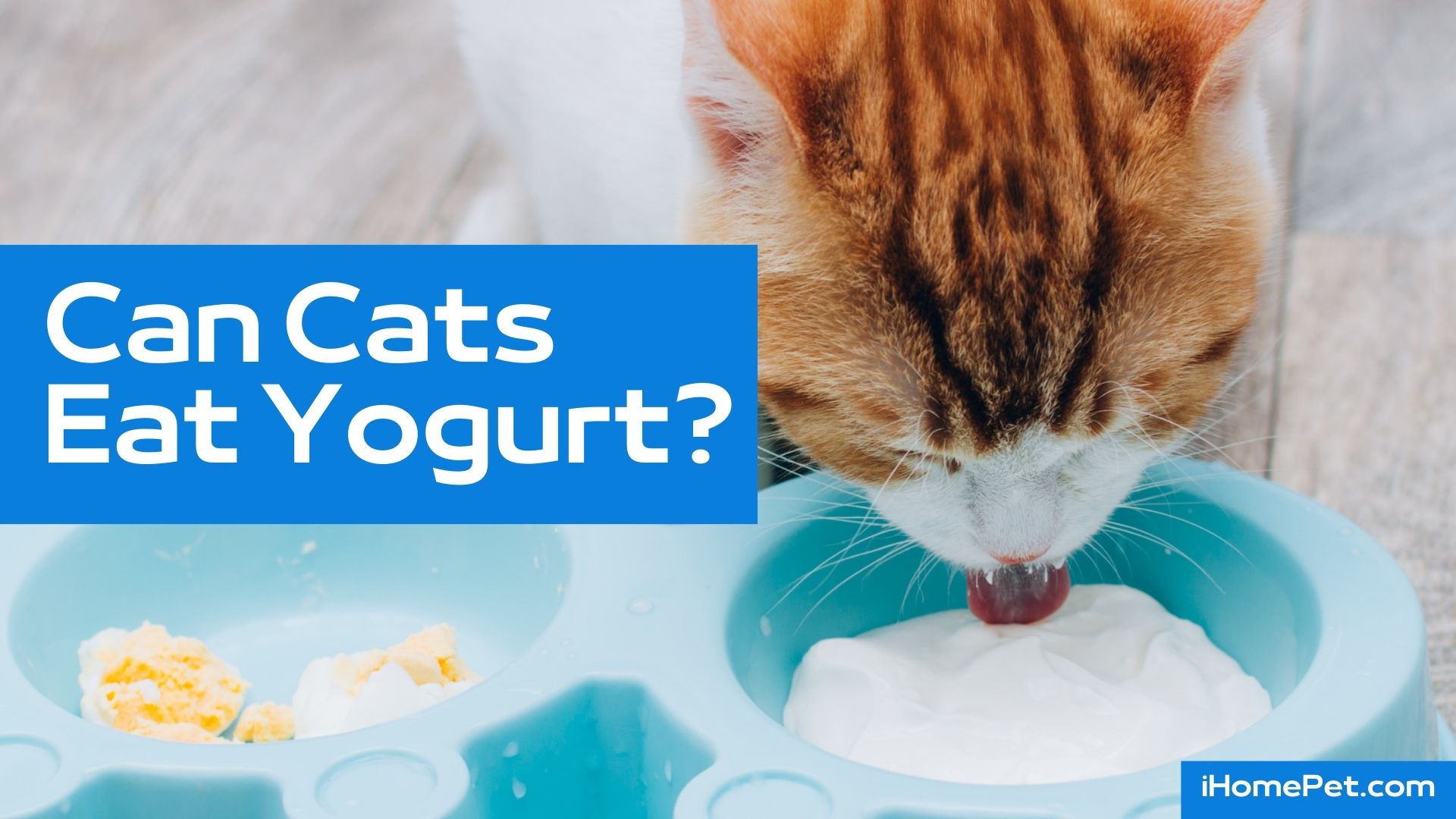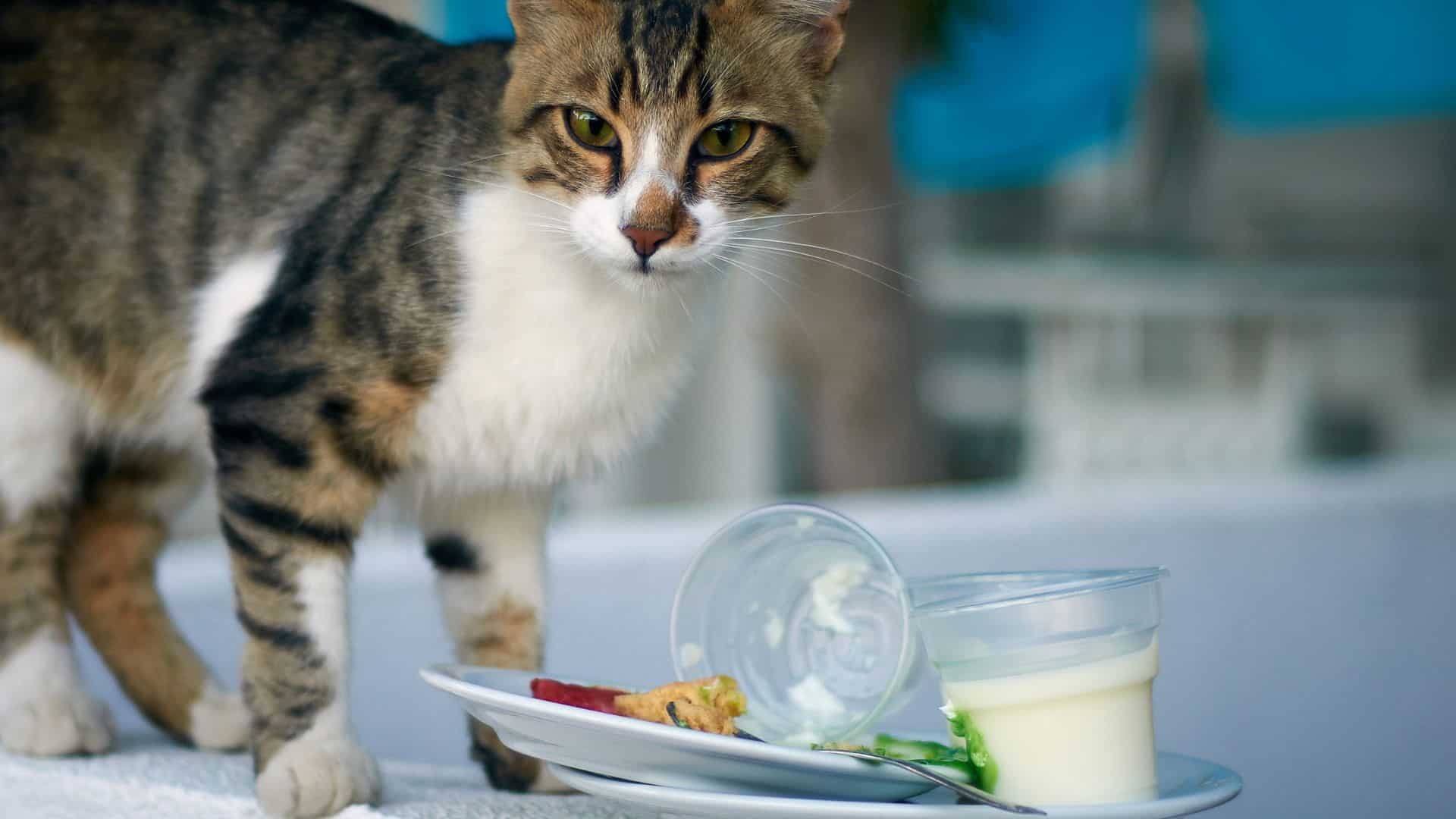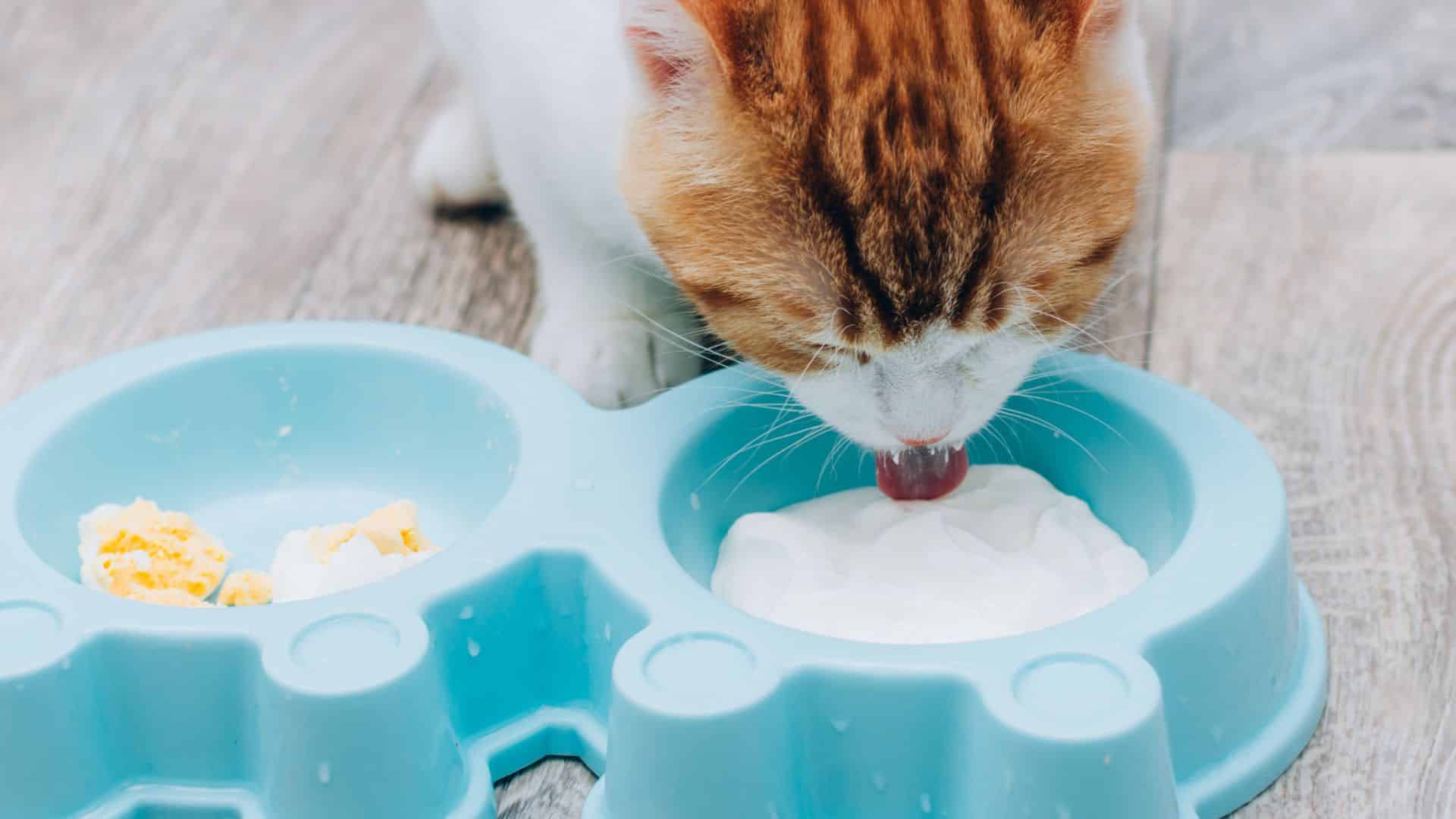Those kitty eyes can make you forget the most basic rule of feeding cats. You are tempted to let her have some too, but then you remember that cats should not be fed on milk. Then you start wondering, can cats eat yogurt?
Let us picture this; you are seated gracefully in your living room enjoying a glass of ice cold yogurt. Your adorable cat is sleeping lazily on the seat next to you. She suddenly wakes up and looks straight at you as you take a sip.
To help you out when you find yourself in such a scenario in the future, this article intends to discuss this contentious topic explicitly. At the end of it all, you should be able to make an informed decision on whether to give your kitty some yogurt or not.
Can Cats Eat Yogurt?

As a caring cat owner, you already did some research around the web on how best to take care of your feline friend. You have without a doubt come across articles that describe how dairy products, particularly milk is bad for cats.
Research has it that cats lack amylase enzyme in their digestive system. This makes it impossible for them to digest lactose intolerance any sugar present in milk. Adult cats cannot tolerate lactose hence their inability to digest cow milk. This is why cat owners are advised not to give milk to their cats.
Yogurt is basically a dairy product, right? Does this make it harmful to cats? Not really. Yogurt is no ordinary dairy product many cats, although it is made from cow milk. Yogurt without any sugar substitutes can be a healthy snack for your cat.
Why is Yogurt then not Harmful to Cats?
Sounds weird, right? Well, let us break down this mystery. Yogurt contains naturally occurring bacteria and cultures that are still active. These yogurt cultures are responsible for the breaking down of the lactose into lactic acid. This process occurs during the fermentation stage.
The cat’s digestive system, therefore, has its work cut out. The cat does not have to deal with the lactose nuisance. Some cats do not tolerate dairy products or added sugars so you need to be careful and read the label before you fee your cat yogurt.
Are there any precautions?
Now that the “ can cats eat yogurt?” question has been answered, and it is a YES, some of you might want to run around and feed your cat all manner of yogurt brands. Hold your horses there buddy, not any random yogurt should go down your feline friend’s mouth.
Before you give your Kitty any yogurt, make sure she is not allergic to it. Start by giving the smallest amounts at a time and checking her reactions to it. You are also advised to only feed your cat on unsweetened and or unflavored yogurt. She may not like the taste kitten yogurt very much, but her health supersedes any taste preferences.
Sweetened yogurt contains a lot of sugars. These are not handled really well by the kitty’s digestive system. The high sugar content in combination with other additives causes problems to the cat since they cannot be broken down by the cat. Serve the yogurt in very moderate quantities.
Benefits of Yogurt to Your Cat

Traditional yogurt does not only taste good to your cat. It offers a variety of health benefits to the cat as well. Here are some of the benefits your cat would be getting by drinking yogurt.
#1. Rich in nutrients
Yogurt is known to be rich in minerals such as potassium, magnesium and calcium. These minerals are essential for the proper functioning of the body. Potassium maintains the liquid equilibrium in the body as well as controlling the enzymatic activities in the body.
Magnesium helps in the absorption of other nutrients in the body while calcium is responsible for the development of strong bones and muscles.
#2. Solves digestive issues
Yogurt is a good remedy for stomach upsets in cats. This is especially essential when she is having difficulties in digesting hairballs. Some human foods
#3. Improved dental health care
The cultures present in yogurt maintain the flow of liquids in the cat’s mouth. In addition, there is flora in yogurt. The flora prevents gum infections, keeping the kitty’s teeth super healthy.
#4. Diarrhea relief
Yogurt is known to be probiotic is nature. This unique characteristic helps it in foods cats get rid of diarrhea, cramps and gas as well. If your cat is very ill from diarrhea, a small serving of yogurt before a meal goes a long way in causing some relief to the cat.
The yogurt also has a soothing effect on the digestive tract, relieving it of any indigestion problems. The yogurt served should not be flavored or sweetened to prevent further complications.
#5. Increased appetite
Nothing stresses a cat owner than a cat who cannot eat her cat’s food. Yogurt comes in handy in such circumstances. Research and studies have shown that a small yogurt serving per day increases a cat’s appetite for food. The more a cat eats, the more she stays healthy and resistant to diseases.
Disadvantages of Yogurt
Despite the numerous advantages yogurt provides to your cat’s diet, it comes with its own sets of problems too. Here are some of the adverse effects you should watch out for as you feed yogurt to your cat.
1. Watch out for allergic reactions
There are a number of cats who are allergic to yogurt and the smallest consumption leads to a massive stomach or upset stomach. Do not let your cat be a victim. Serve the smallest amount first for a first time yogurt consumer cat. Then watch out of any potential reactions.
2. Flavored yogurts
It may be appealing to your taste buds, but it will not be that friendly to your cat. The high sugar proportion is not digestible by the cat. This causes digestive complications.
3. Dehydration
Although yogurt offers relief for a cat with diarrhea, it may result in diarrhea itself in some cats. The diarrhea is accompanied by vomiting. These are the recipes for dehydration in your feline friend if not sorted out sooner. Consult your vet in case the cat vanilla yogurt has any of such effects on your cat’s health.
So, How Much Yogurt Can You Give Your Cat?

Can cats eat yogurt? Yes. Cats can being eating yogurt, but only in small quantities, served in moderation. However, those cats that are lactose intolerant should not be given yogurt as it can cause digestive issues. It is always best to consult with a veterinarian before introducing any new food into a cat’s balanced diet.
There is a limit to which sugar free yogurt would be safe for your kitty. But what is the limit? You should offer it preferably a day per week, with no more than two teaspoons of it. Beyond this, even the preferred unsweetened yogurt would become unsafe for your kitten.
Can Cats Drink milk?
Your cats are used to drink their mother’s milk when they are kittens. However, as adult cats, their ability to digest lactose decreases significantly. It is best to avoid giving them regular cow’s milk as it can lead to digestive problems such as diarrhea.
As obligate carnivores, they will benefit more from a complete diet consisting of meat and water. If you want to give your cat a milk-like treat, there are specially formulated cat milk products available in pet stores that are lactose-free and safe for them to consume.
Feeding yogurt to your furry friend can cause an allergic reaction or upset stomach due to the presence of lactose. Some yogurt brands have artificial sweeteners and other toxic ingredients that can be harmful to cats if consumed in large quantities.
Bottom line.
Now that the “ can cats eat greek yogurt ” question has been answered, it is worth remembering that a cat is an obligate carnivore and does not entirely need plain greek yogurt to survive. Lots of proteins (meat) should be provided.
Can cats eat vanilla yogurt? I thought you might ask. Flavored yogurt is discouraged; give only plain yogurt to your cat. The yogurt should just be given as a occasional treat or as a once in a while meal. Do not make it become part and parcel of the cat’s feeding program.
Last Updated on 16/03/2025 by Karen Snow
Hi! I’m Karen and a certified dog lover. As a freelance writer and blogger, I do my best to squeeze in some time with my dogs, learning more about the way they act and how I can make sure that they continue to stay well-cared for by yours truly.
My dogs have helped me through a lot, and this is my way of giving back to them! Besides animals, I also love to travel and cook, having explored my country’s restaurants and unique places. Follow me as I show you all the amazing tips and bits of information I learn along the way about our furry friends!
